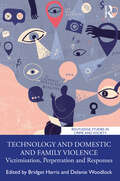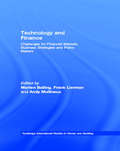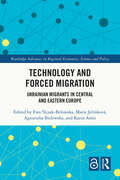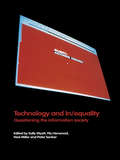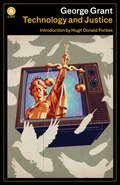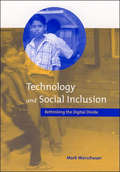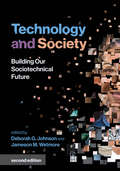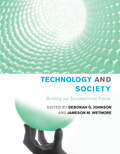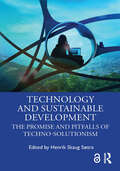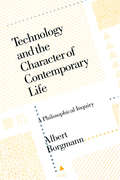- Table View
- List View
Technology and Domestic and Family Violence: Victimisation, Perpetration and Responses (Routledge Studies in Crime and Society)
by Bridget Harris Delanie WoodlockThis book brings together academics and advocates to explore an emerging issue: the use of technology by perpetrators of domestic and family violence. Of interest too is critique of government and non-government activities in this arena and how technology can be harnessed to respond to harm. Domestic and family violence (DFV) is widely recognised as an important social issue, impacting the safety and wellbeing of victim/survivors and their children, and on a broader scale, threatening risk and security on global levels. This book provides insights drawn from research and practice in the Global South and Global North to provide an evidence base and real-world solutions and initiatives to understand, address and ultimately prevent technology-facilitated domestic and family violence and how technology can be used to effect positive change and empower victim/survivors and communities. Technology and Domestic and Family Violence will be of great interest to students and scholars on victimology, criminology, social work, law, women’s studies, sociology and media studies. It will also be a valuable reference for practitioners, government and non-government advocates working on issues around domestic violence.
Technology and Empire: Perspectives On North America
by George GrantBrilliant and still-timely analysis of the implications of technology-driven globalization on everyday life from Canada’s most influential philosophers, reissued in a handsome A List edition, featuring an introduction by Andrew Potter.Originally published in 1969, Technology and Empire offers a brilliant analysis of the implications of technology-driven globalization on everyday life. The author of Lament for a Nation, George Grant has been recognized as one of Canada’s most significant thinkers. In this sweeping essay collection, he reflects on the extent to which technology has shaped our modern culture.
Technology and Engagement: Making Technology Work for First Generation College Students
by Mandy Savitz-Romer Heather T. Rowan-Kenyon Ana M. Martínez AlemánTechnology and Engagement is based on a four-year study of how first generation college students use social media, aimed at improving their transition to and engagement with their university. Through web technology, including social media sites, students were better able to maintain close ties with family and friends from home, as well as engage more with social and academic programs at their university. This ‘ecology of transition’ was important in keeping the students focused on why they were in college, and helped them become more integrated into the university setting. By showing the gains in campus capital these first-generation college students obtained through social media, the authors offer concrete suggestions for how other universities and college-retention programs can utilize the findings to increase their own retention of first-generation college students.
Technology and Finance: Challenges for Financial Markets, Business Strategies and Policy Makers (Routledge International Studies In Money And Banking Ser. #Vol. 17)
by Andy Mullineux Morten Balling Frank LiermanTechnology and Finance analyses the dramatic implications of technology for today's financial sector, for productivity growth and for monetary policy. A wide range of financial market activities are now technology driven; technology is also crucial in retail, private and corporate banking, and it has lowered entry barriers to the sector. New partic
Technology and Forced Migration: Ukrainian Migrants in Central and Eastern Europe (Routledge Advances in Regional Economics, Science and Policy)
by Ewa Ślęzak-Belowska Marie Jelínková Agnieszka Bielewska Karin AmitThe Russian aggression on Ukraine has drastically altered the migration situation in Central and Eastern Europe (CEE), drawing international attention. Despite numerous global studies on individuals seeking refuge, CEE remains underresearched. This book details the recent, lesser-known experiences of countless forced migrants who arrived there.Given the pivotal role of information and telecommunication technologies (ICTs) for both migrants and host societies, the book explores the intersection of ICTs and forced migration. With this in mind, the book focuses on Poland, Czechia, Slovakia, and Hungary, and uses comprehensive research and robust qualitative methods to demonstrate how these countries are emerging as New Immigration Destinations and handling the influx of Ukrainians. Contributions from economists, sociologists, and political scientists provide a thorough examination of how Ukrainian forced migrants navigate their lives using modern technologies, as well as their impact on these technologies.Essential reading for academics, policymakers, and professionals in the fields of migration studies, digital governance, and European affairs, this book uniquely highlights the vital role of ICTs in migration decisions, journeys, settlement, and integration. It provides a balanced mix of theoretical analysis and practical insights, helping readers comprehend the interplay between ICTs and migration. Readers will obtain a better understanding of the challenges and opportunities that digital technologies bring in facilitating and regulating forced migration in this part of Europe.
Technology and Gender: Fabrics of Power in Late Imperial China
by Francesca BrayIn this feminist history of eight centuries of private life in China, Francesca Bray inserts women into the history of technology and adds technology to the history of women. Bray takes issue with the Orientalist image that traditional Chinese women were imprisoned in the inner quarters, deprived of freedom and dignity, and so physically and morally deformed by footbinding and the tyrannies of patriarchy that they were incapable of productive work. She proposes a concept of gynotechnics, a set of everyday technologies that define women's roles, as a creative new way to explore how societies translate moral and social principles into a web of material forms and bodily practices.Bray examines three different aspects of domestic life in China, tracing their developments from 1000 to 1800 A.D. She begins with the shell of domesticity, the house, focusing on how domestic space embodied hierarchies of gender. She follows the shift in the textile industry from domestic production to commercial production. Despite increasing emphasis on women's reproductive roles, she argues, this cannot be reduced to childbearing. Female hierarchies within the family reinforced the power of wives, whose responsibilities included ritual activities and financial management as well as the education of children.
Technology and In/equality: Questioning the Information Society
by Sally Wyatt Nod Miller Flis Henwood Peter SenkerTechnology and In/equality explores the diverse implications of the new information and communication technologies through case studies of their applications in three main areas - media, education and training, and work. Questions of access to and control over crucial resources such as information, knowledge, skills and income ae addressed drawing upon insights from science and technology studies, innovation theory, sociology and cultural studies. All of the chapters question the meanings of the terms 'technology' and 'inequality' and of the widespread association of technology with progress. Written with a non-specialist readership in mind, all complex theories and key concepts are carefully explained making the book easily accessible and relevant to a wide range of courses.
Technology and Industrial Growth in Pre-War Japan: The Mitsubishi-Nagasaki Shipyard 1884-1934 (Nissan Institute/Routledge Japanese Studies)
by Yukiko FukasakuThis book aims to discredit the myth that has the `unique cultural traits' of the Japanese as the key to the country's success, arguing that the more realisable foundation of long-term investment in training and research is responsible.The book looks at the development of Japan in the pre-War period. Yukiko Fukusaku sees the achievements of this period as central to the present competitiveness of the country's industrial technology. She uses the Mitsubishi Nagasaki shipyard as a case study, looking at technological innovation and training as the keys to long-term stability and economic success.The book has implications for industrial development worldwide. Japan's starting point over a century ago was similar to the present conditions of many developing countries and the book's emphasis on the acquisition of better skills as a key to development is as relevant to Europe and America as it is to the Third World.
Technology and Industrial Parks in Emerging Countries
by Daniel Hardy Andrés Rodríguez-PoseIndustrial and technology parks are commonly regarded as a policy panacea. They tend to be considered as the ideal instrument to alleviate an assortment of institutional, political, economic, social and ultimately, technological weaknesses and often form the centrepiece of development strategies. Yet, the real impact of industrial and technology parks, especially in emerging countries is still poorly understood. Focusing on examples from Latin America, Asia, Africa and the Middle East, the book represents a first approach to understand the potential and reality of industrial and technology parks in emerging countries. It is argued that although some parks have been successful in addressing a range of key problems, including underdevelopment, unemployment and a lack of investment, the majority have failed to deliver, rendering the promise of many parks little more than a pipedream.
Technology and Innovation for Social Change
by Satyajit Majumdar Samapti Guha Nadiya MarakkathTension exists between technologists and social thinkers because of the impact technology and innovation have on social values and norms, which is often viewed as damaging to the cultural fabric of a nation or society. Since the global business environment is the context in which implementation of technology and innovation takes place, it is widely accepted as the major reason for such conflicts. In this backdrop, this edited book integrates independent research from across the globe. It deals with the nature and significance of technology, innovation and social change as well as the relationships between them, and discusses the significance of social entrepreneurship from social innovation and technology perspectives. Research areas covered are related to the development and deployment of technology, innovation and knowledge in social change, capabilities of institutions, models, role of government and corporate social responsibility and community involvement. Multiple aspects of social change are discussed in the context of India, Mexico, Thailand, Cambodia, Laos, Vietnam, Ethiopia, Nigeria and other African countries. But society does not silently accept technologically enforced changes; sometimes technology is seen as an enemy of inclusive growth and for many, economic development is an anti-thesis of social change. Selected case studies on sector-specific technologies, such as the use of genetically modified seeds in agriculture, which has impacted the market and society, are critically analyzed to develop insights into the adoption of technology and its impact. At the same time it examines policy related issues, without any bias in favor of, or against, a specific technology.
Technology and Justice (A List)
by George GrantSix magnificent and stimulating essays examining the role of technology in shaping how we live, by one of Canada’s most influential philosophers, now reissued in a handsome A List edition.Originally published in 1986, the six essays that comprise Technology and Justice offer absorbing reflections on the extent to which technology has shaped the way we live now. George Grant explores the fate of traditional values in modern education, social behaviour, and religion, and offers his insights into some of the most contentious ethical deliberations of the past half-century.In essays ranging in content from classical philosophy to the morals of euthanasia, Technology and Justice showcases Grant’s stimulating commentary on the meaning of the North American experience.
Technology and Medical Practice: Blood, Guts and Machines (Theory, Technology and Society)
by Boel BernerThe advanced technologies being used in diagnosis and care within modern medicine, whilst supporting and making medical practices possible, may also conflict with established traditions of medicine and care. What happens to the patient in a technologized medical environment? How are doctors', nurses' and medical scientists' practices changed when artefacts are involved? How is knowledge negotiated, or relations of power reconfigured? Technology and Medical Practice addresses these developments and dilemmas, focusing on various practices with technologies within hospitals and sociotechnical systems of care. Combining science and technology studies with medical sociology, the history of medicine and feminist approaches to science, this book presents analyses of artefacts-in-use across a variety of settings within the UK, USA and Europe, and will appeal to sociologists, anthropologists and scholars of science and technology alike.
Technology and Oligopoly Capitalism
by Luis Suarez-VillaTechnology and Oligopoly Capitalism is a major contribution to our understanding of how technology oligopolies are shaping America’s social, economic, and political reality. Technology oligopolies are the most powerful socioeconomic entities in America. From cradle to grave, the decisions they make affect the most intimate aspects of our lives, how we work, what we eat, our health, how we communicate, what we know and believe, whom we elect, and how we relate to one another and to nature. Their power over markets, trade, regulation, and most every aspect of our governance is more intrusive and farther-reaching than ever. They benefit from tax breaks, government guarantees, and bailouts that we must pay for and have no control over. Their accumulation of capital creates immense wealth for a minuscule elite, deepening disparities while politics and governance become ever more subservient to their power. They determine our skills and transform employment through the tools and services they create, as no other organizations can. They produce a vast array of goods and services with labor, marketing, and research that are more intrusively controlled than ever, as workplace rights and job security are curtailed or disappear. Our consumption of their products—and their capacity to promote wants—is deep and far reaching, while the waste they generate raises concerns about the survival of life on our planet. And their links to geopolitics and the martial domain are stronger than ever, as they influence how warfare is waged and who will be vanquished. Technology and Oligopoly Capitalism’s critical, multidisciplinary perspective provides a systemic vision of how oligopolistic power shapes these forces and phenomena. An inclusive approach spans the spectrum of technology oligopolies and the ways in which they deploy their power. Numerous, previously unpublished ideas expand the repertory of established work on the topics covered, advancing explanatory quality—to elucidate how and why technology oligopolies operate as they do, the dysfunctions that accompany their power, and their effects on society and nature. This book has no peers in the literature, in its scope, the unprecedented amount and diversity of documentation, the breadth of concepts, and the vast number of examples it provides. Its premises deserve to be taken into account by every student, researcher, policymaker, and author interested in the socioeconomic and political dimensions of technology in America.
Technology and Place
by Steven A. MooreDeveloping "sustainable" architectural and agricultural technologies was the intent behind Blueprint Farm, an experimental agricultural project designed to benefit farm workers displaced by the industrialization of agriculture in the Rio Grande Valley of Texas. Yet, despite its promise, the very institutions that created Blueprint Farm terminated the project after just four years (1987-1991). In this book, Steven Moore demonstrates how the various stakeholders' competing definitions of "sustainability," "technology," and "place" ultimately doomed Blueprint Farm. He reconstructs the conflicting interests and goals of the founders, including Jim Hightower and the Texas Department of Agriculture, Laredo Junior College, and the Center for Maximum Potential Building Systems, and shows how, ironically, they unwittingly suppressed the self-determination of the very farm workers the project sought to benefit. From the instructive failure of Blueprint Farm, Moore extracts eight principles for a regenerative architecture, which he calls his "nonmodern manifesto. "
Technology and Psychological Well-being
by Yair Amichai-HamburgerIn the modern world we are surrounded by technology. Gadgets such as cell phones, portable computers, and electronic diaries accompany us throughout the day. But is this a good thing? Are we being served by these technological wonders, or have we become enslaved by them? Does constant availability via technology make us more efficient or more stressed? Is our ability to connect with others all over the world, day or night, making us more sociable or turning us into recluses in a virtual world? This book considers the impact of technology on the different spheres of our life - work, home, family and leisure - and assesses ways in which to build better communication between technology developers and society to ensure that technology enhances our lives and psychological well-being, rather than damaging them.
Technology and Rationality (Routledge Revivals)
by Thomas KroghFirst published in 1998, this volume deals with the position and role that the technology of modern society has traditionally had and ought to have within modern social philosophy and social theory. These two considerations are by no means one and the same. This selectivity is expressed both by Thomas Krogh’s choice of historical writers and in the systematic orientation towards a discussion of the way in which technology is treated in social philosophy or social theories that have been inspired by and reflect philosophy, and that move on a relatively high level of abstraction. These include those proposed by Gehlen, Marx, Sartre, Habermas and Luhmann.
Technology and Social Inclusion: Rethinking the Digital Divide (The\mit Press Ser.)
by Mark WarschauerMuch of the discussion about new technologies and social equality has focused on the oversimplified notion of a "digital divide." Technology and Social Inclusion moves beyond the limited view of haves and have-nots to analyze the different forms of access to information and communication technologies. Drawing on theory from political science, economics, sociology, psychology, communications, education, and linguistics, the book examines the ways in which differing access to technology contributes to social and economic stratification or inclusion. The book takes a global perspective, presenting case studies from developed and developing countries, including Brazil, China, Egypt, India, and the United States.A central premise is that, in today's society, the ability to access, adapt, and create knowledge using information and communication technologies is critical to social inclusion. This focus on social inclusion shifts the discussion of the "digital divide" from gaps to be overcome by providing equipment to social development challenges to be addressed through the effective integration of technology into communities, institutions, and societies. What is most important is not so much the physical availability of computers and the Internet but rather people's ability to make use of those technologies to engage in meaningful social practices.
Technology and Society, second edition: Building Our Sociotechnical Future (Inside Technology)
by Edited by Deborah G. Johnson and Jameson M. WetmoreWritings by thinkers ranging from Rokeya Sakhawat Hossain to Bruno Latour that focus on the interconnections of technology, society, and values.Technological change does not happen in a vacuum; decisions about which technologies to develop, fund, market, and use engage ideas about values as well as calculations of costs and benefits. In order to influence the development of technology for the better, we must first understand how technology and society are inextricably bound together. These writings--by thinkers ranging from Bruno Latour to Francis Fukuyama--help us do just that, examining how people shape technology and how technology shapes people. This second edition updates the original significantly, offering twenty-one new essays along with fifteen from the first edition. The book first presents visions of the future that range from technological utopias to cautionary tales and then introduces several major STS theories. It examines human and social values and how they are embedded in technological choices and explores the interesting and subtle complexities of the technology-society relationship. Remedying a gap in earlier theorizing in the field, many of the texts illustrate how race and gender are intertwined with technology. Finally, the book offers a set of readings that focus on the sociotechnical challenges we face today, treating topics that include cybersecurity, geoengineering, and the myth of neutral technology.
Technology and Society: Building Our Sociotechnical Future
by Deborah G. Johnson Jameson M. WetmoreTechnological change does not happen in a vacuum; decisions about which technologies to develop, fund, market, and use engage ideas about values as well as calculations of costs and benefits.
Technology and Society: Building our Sociotechnical Future (Inside Technology #28)
by Deborah G. Johnson Jameson M. WetmoreAn anthology of writings by thinkers ranging from Freeman Dyson to Bruno Latour that focuses on the interconnections of technology, society, and values and how these may affect the future. Technological change does not happen in a vacuum; decisions about which technologies to develop, fund, market, and use engage ideas about values as well as calculations of costs and benefits. This anthology focuses on the interconnections of technology, society, and values. It offers writings by authorities as varied as Freeman Dyson, Laurence Lessig, Bruno Latour, and Judy Wajcman that will introduce readers to recent thinking about technology and provide them with conceptual tools, a theoretical framework, and knowledge to help understand how technology shapes society and how society shapes technology. It offers readers a new perspective on such current issues as globalization, the balance between security and privacy, environmental justice, and poverty in the developing world. The careful ordering of the selections and the editors' introductions give Technology and Society a coherence and flow that is unusual in anthologies. The book is suitable for use in undergraduate courses in STS and other disciplines. The selections begin with predictions of the future that range from forecasts of technological utopia to cautionary tales. These are followed by writings that explore the complexity of sociotechnical systems, presenting a picture of how technology and society work in step, shaping and being shaped by one another. Finally, the book goes back to considerations of the future, discussing twenty-first-century challenges that include nanotechnology, the role of citizens in technological decisions, and the technologies of human enhancement.
Technology and Sustainable Development: The Promise and Pitfalls of Techno-Solutionism
by Henrik Skaug SætraTechnological change is at the core of all major disruptions in human history, and revolutions, wars, and general development are regularly connected to some sort of technological change. However, not all development is beneficial. While technology has fueled great innovations and rapid development, the notion of sustainable development has gained prominence as we now experience serious social, economic, and environmental challenges. This book examines whether technology can be used to fix the very problems caused by technology, as the various chapters examine different aspects related to how technology has brought us where we are today (which some will say is the best place humanity’s been at according to a range of metrics), and whether technology helps or hinders us in our efforts to solve the challenges we currently face. The issues discussed cover the three sustainability dimensions and include topics such as the materiality of AI, technology in education, AI for gender equality, innovation and the digital divide, and how technology relates to power, the political system, and capitalism. The chapters all build on the theoretical backdrop of technological change, sustainable development, and the UN’s Sustainable Development Goals are actively used throughout this book, both to examine how these goals capture or overlook central elements of sustainable development, and also to facilitate and create a common framework of engagement between the chapters. This book provides a novel combination of traditional theories that are explored through different case studies, providing the ground for a better understanding of how and when technology can –and cannot –be the enabler of sustainable development. It is thus an important resource for students of all disciplines, technologists, and those developing and applying new technologies. It is also a valuable resource for politicians and regulators attempting to harness the power of technology for good, while limiting its negative potential. The Open Access version of this book, available at www.taylorfrancis.com, has been made available under a Creative Commons [Attribution-Non Commercial-No Derivatives (CC-BY-NC-ND)] 4.0 license. Funded by Ostfold University College.
Technology and Women's Empowerment (Routledge Studies in Gender and Economics)
by Ewa LechmanThe near-ubiquitous spread of ICT offers unprecedented opportunities for social and economic agents, reshapes social and economic structures and drives the emergence of socioeconomic networks. This book contributes to the growing body of literature and present state of knowledge, offering the reader broad evidence on how new information and communication technologies impact women’s economic and social empowerment and hence have an impact on overall welfare creation. More specifically, it concentrates on demonstrating how ICT may become "empowering technologies" through their implementation. The book is designed to provide deep insight into the theoretical and empirical evidence on ICT as a significant driver of women`s social and economic development. Special focus is given to examining the following broad topics: channels of ICT impact on women's development; the role of ICT in enhancing women's active participation in formal labor markets; examples of how ICT encourages education, skills development, institutions development et alia, and thus contributes to women’s social and economic empowerment, as well as case-based evidence on ICT's role in fostering women’s equality. The primary audience for the book will be scholars and academic professionals from a wide variety of disciplines but mainly those who are concerned with addressing the issues of economic development and growth, social development, the role of technology progress in the context of broadly defined socioeconomic progress.
Technology and Women's Voices: Keeping in Touch
by Cheris KramaraeFirst published in 1988. Routledge is an imprint of Taylor & Francis, an informa company.
Technology and the Character of Contemporary Life: A Philosophical Inquiry
by Albert BorgmannBlending social analysis and philosophy, Albert Borgmann maintains that technology creates a controlling pattern in our lives. This pattern, discernible even in such an inconspicuous action as switching on a stereo, has global effects: it sharply divides life into labor and leisure, it sustains the industrial democracies, and it fosters the view that the earth itself is a technological device. He argues that technology has served us as well in conquering hunger and disease, but that when we turn to it for richer experiences, it leads instead to a life dominated by effortless and thoughtless consumption. Borgmann does not reject technology but calls for public conversation about the nature of the good life. He counsels us to make room in a technological age for matters of ultimate concern—things and practices that engage us in their own right.
Technology and the Character of Contemporary Life: A Philosophical Inquiry
by Albert BorgmannBlending social analysis and philosophy, Albert Borgmann maintains that technology creates a controlling pattern in our lives. This pattern, discernible even in such an inconspicuous action as switching on a stereo, has global effects: it sharply divides life into labor and leisure, it sustains the industrial democracies, and it fosters the view that the earth itself is a technological device. He argues that technology has served us as well in conquering hunger and disease, but that when we turn to it for richer experiences, it leads instead to a life dominated by effortless and thoughtless consumption. Borgmann does not reject technology but calls for public conversation about the nature of the good life. He counsels us to make room in a technological age for matters of ultimate concern—things and practices that engage us in their own right.
